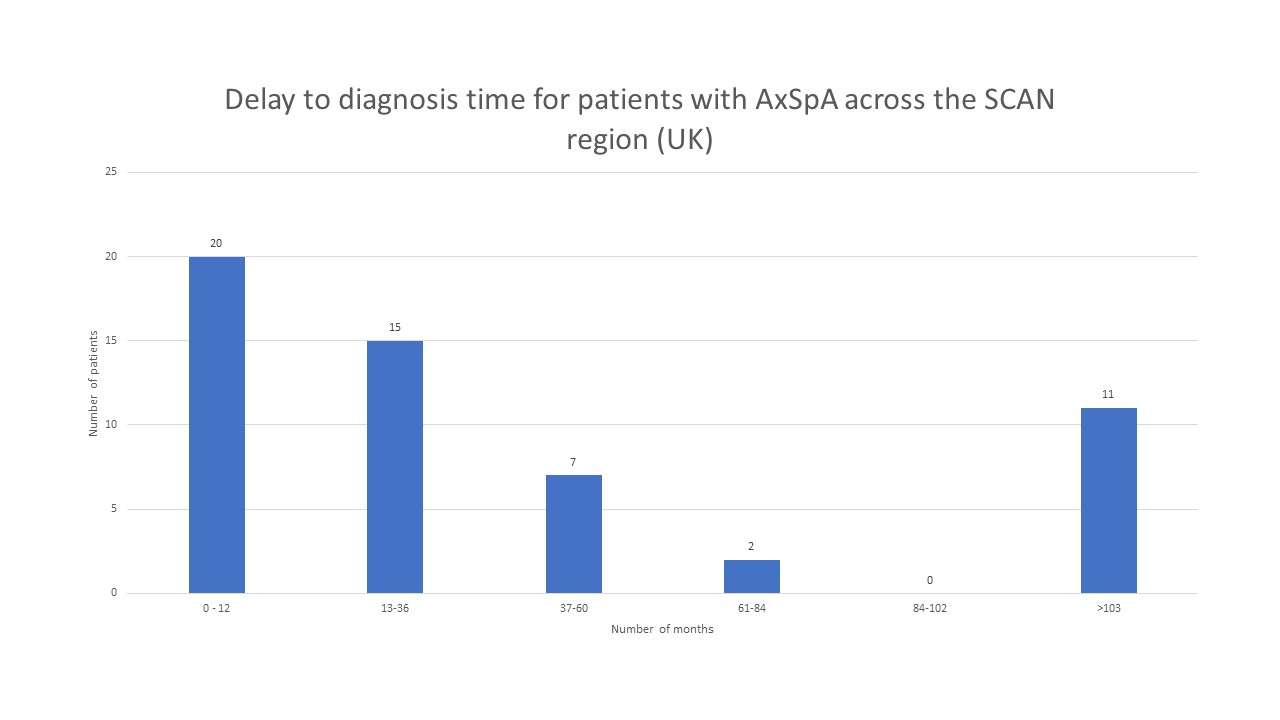Session Information
Session Type: Poster Session C
Session Time: 9:00AM-11:00AM
Background/Purpose: Due to the insidious onset of axial spondyloarthritis (AxSpA), there is often a significant delay to diagnosis. The average delay to diagnosis in the UK is 8.5 years. This is associated with several adverse sequelae including poor disease-related quality of life and worse overall health outcomes. In addition, there are substantial health-economic costs associated with this. Recent modelling data in the UK, commissioned by the National Axial Spondyloarthritis Society (NASS), demonstrated the average financial cost of this delay to be £196,000 ($243,000 US) per person affected. There is now a focus on reducing diagnostic delay for patients with AxSpA. The South Central Axial Spondyloarthritis Network (SCAN) is a network of NHS (National Health Service) Rheumatology departments in hospitals across south-central UK. The group is multidisciplinary.
Methods: We undertook a retrospective data collection of 5-10 sequential cases of newly diagnosed AxSpA from 6 different regional hospitals within the SCAN network. A total of 55 patient cases was included in this cohort. We categorised data in terms of length of delay to diagnosis from first symptom onset. A primary aim was to establish what proportion of our regional patient cohort received a diagnosis within 1 year of first symptom onset. This target aligns with the target set by NASS (UK) and represents the world’s first gold standard time to diagnosis of 1 year. Data was also collected about gender and age at diagnosis.
Results: Based on this representative sample from our region, the gold standard time to diagnosis (within 1 year) is being acheived in 36% of our patient cohort. A further significant proportion of patients (27%) received a diagnosis between 13-36 months following first symptom onset. However, 20% of patients in our cohort are waiting longer than the national average of 8.5 years (or 103 weeks) before receiving a diagnosis of AxSpA.
One-third of our patient cohort (33%) were female. The average age of the patients at the time of diagnosis was 36.8 years.
Conclusion: Whilst acknowledging the relatively modest size of the sample, this regional multicentre dataset has allowed us to establish that 36% of our patient cohort achieved a gold standard time to diagnosis (within 1 year of first symptom onset). The majority of patients (63%) received a diagnosis within 36 months of first symptoms onset. it is important to also highlight that 20% of patients endured a longer than UK national average delay to diagnosis ( >103 months/ >8.5 years).
We are aiming to improve our delay to diagnosis by introducing a standardised regional referral proforma for patients with suspected AxSpA. This can be used in primary care to guide clinicians and facilitate earlier referral to Rheumatology. The aims of this intervention would be to increase the proportion of patients achieving a gold standard time to diagnosis and reduce the proportion of patients in all the other time categories, especially those patients with the longest delay to diagnosis. By sharing this work we hope that other global colleagues may also review their own local data and consider service improvement initiatives to reduce delay to diagnosis for patients with AxSpA.
To cite this abstract in AMA style:
Dulay G, Chan A, Boys C, Coy A, Devin M, Goh L, McDougall A, Rigler K, Tomkins J, Wallis D, Williams E. What Is Our Regional Delay to Diagnosis in Patients with Axial Spondyloarthropathy – Are We Hitting the Target? Data from a Multi-centre UK Patient Cohort [abstract]. Arthritis Rheumatol. 2023; 75 (suppl 9). https://acrabstracts.org/abstract/what-is-our-regional-delay-to-diagnosis-in-patients-with-axial-spondyloarthropathy-are-we-hitting-the-target-data-from-a-multi-centre-uk-patient-cohort/. Accessed .« Back to ACR Convergence 2023
ACR Meeting Abstracts - https://acrabstracts.org/abstract/what-is-our-regional-delay-to-diagnosis-in-patients-with-axial-spondyloarthropathy-are-we-hitting-the-target-data-from-a-multi-centre-uk-patient-cohort/

